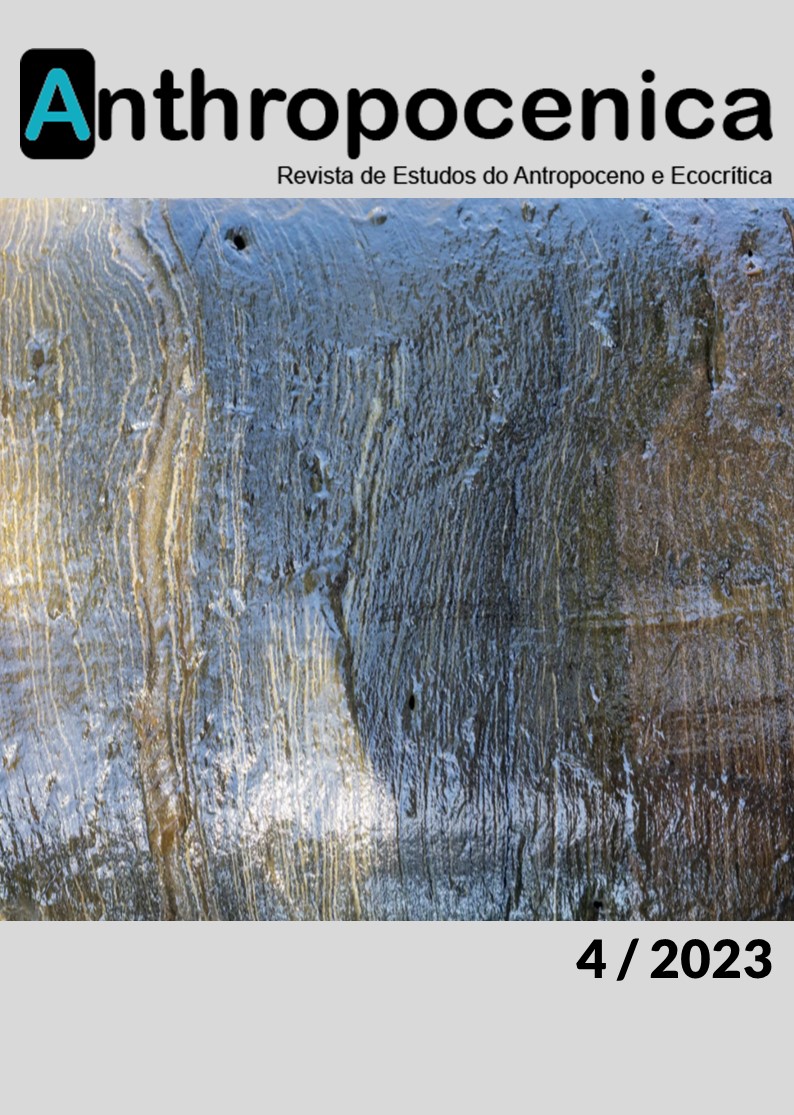A ficção climática: ponderações sobre o realismo como caminho para pensar os efeitos subjetivos do Antropoceno
DOI:
https://doi.org/10.21814/anthropocenica.4859Palavras-chave:
Ficção Climática; Cli-fi; Antropoceno; Ecocrítica; Literatura Norte-Americana.Resumo
Este artigo trata da tendência na ficção realista contemporânea de abordar as mudanças climáticas, uma das questões mais urgentes da atualidade. Na literatura norte-americana, há uma série de obras que tratam desse tema como pano de fundo ou como elemento norteador da narrativa no contexto do Antropoceno, a possível nova época geológica marcada pelo impacto humano nos sistemas biofísicos da Terra. O artigo explora o conceito do Antropoceno e discute como o termo tem sido utilizado nas humanidades para refletir sobre as relações entre natureza e cultura, as práticas humanas de exploração e dominação da natureza, e as hierarquias sociais baseadas em raça, gênero e classe. A análise também aborda a emergência da "cli-fi", uma categoria temática na ficção contemporânea que trata das mudanças climáticas, e de que forma a ficção realista contemporânea pode dar conta de explorar as mudanças climáticas de forma a não relegar o assunto apenas à ficção científica e especulativa. O artigo traça uma breve linha histórica das preocupações ambientais na literatura e oferece três exemplos de como a “cli-fi” pode contribuir para a reflexão sobre os impactos antropogênicos nas dimensões subjetivas das personagens e em suas interfaces com a sociedade contemporânea.
Downloads
Referências
Bennett, J. (2010). Vibrant Matter: A Political Ecology of Thing. Duke University Press. DOI: https://doi.org/10.1215/9780822391623
Buell, L. (1995). The Environmental Imagination: Thoreau, Nature Writing, and the Formation of American Culture. Belknap Press of Harvard University Press. DOI: https://doi.org/10.4159/9780674262423
Clark, T. (2014). Nature, Post Nature. In: L. Westling (Ed.), The Cambridge Companion to Literature and the Environment (pp. 75—89). Cambridge University Press. DOI: https://doi.org/10.1017/CCO9781139342728.008
Costa, C. de L. (2014). Os estudos culturais na encruzilhada dos feminismos materiais e descoloniais. Estudos e Literatura Brasileira Contemporânea, 44: 79-103. DOI: https://doi.org/10.1590/2316-4018444
Cunha. R. (2022). Uma viagem narrativa com Thomas King. In: Tag. Índigenas de Letras, abril, 8-11.
Dwyer, J. (2010) Where the Wild Books Are: A Field Guide to Ecofiction. University of Nevada Press.
Garcés, M. (2019) Novo esclarecimento radical. Âyné.
Ghosh, A. (2022). O grande desatino: mudanças climáticas e o impensável. Trad.: Renato Prelorentzou. Quina Editora.
Glotfelty, C. & Fromm, H. (1996). The Ecocriticism Reader: Landmarks in Literary Ecology. University of Georgia Press.
Haraway, D. (2003). The Companion Species Manifesto. Prickly Paradigm Press.
Heise, U. (2006). The Hitchhiker's Guide to Ecocriticism. PMLA, 121(2): 503-516. DOI: https://doi.org/10.1632/003081206X129684
Holsinger, B. (2022). The Displacements. Riverhead Books.
Johns-Putra, A. & Goodbody, A. (2019). The Rise of the Climate Change Novel. In: A. Johns-Putra, (Ed.). Climate and Literature (pp. 229–245). Cambridge University Press. DOI: https://doi.org/10.1017/9781108505321.015
King, T. (2022). Indígenas de Férias. Tag.
King, T. (2022) Entrevista. In: Tag, abril, 25-27.
Kingsolver, B. (2012). Flight Behaviour. Faber and Faber.
Lockwood, P. (2022). No One Is Talking About This. Bloomsbury.
Offill, J. (2020). Weather. Vintage.
Opperman, S. & Iovino, S. (2017). Introduction The Environmental Humanities and the Challenges of the Anthropocene. In: Serpil Oppermann e Serenella Iovino (Eds.), Environmental Humanities: Voices from the Anthropocene. Rowman & Littlefield.
Ozeki, R. (2021). The Book of Form and Emptiness. Canongate.
Parham, J. (2021). Introduction. In: J. Parham (Ed.), The Cambridge Companion to Literature and the Anthropocene (pp. 1–33). Cambridge University Press. DOI: https://doi.org/10.1017/9781108683111.002
Purdy, J. (2015) After Nature: A Politics for the Anthropocene. Harvard University Press. DOI: https://doi.org/10.4159/9780674915671
Royal Museums of Greenwich (s.d.). Pollution in the River Thames: a history Lifeline, water source, sewer? Follow the murky story of London's relationship with the Thames. Retirado de: https://www.rmg.co.uk/stories/topics/pollution-river-thames-history
Slovic, S. (1998). Seeking Awareness in American Nature Writing. University of Utah Press.
Slovic, S. (2010). The Third Wave of Ecocriticism: North American Reflections on the Current Phase of the Discipline. Ecozon@, 1(1): 4-10. DOI: https://doi.org/10.37536/ECOZONA.2010.1.1.312
Thoreau, H. D. (2003). Walden and Civil Disobedience. Barnes & Nobles Classics.
Trexler. A. (2015). Anthropocene Fictions: The novel in a Time of Climate Change. Virginia University Press. DOI: https://doi.org/10.2307/j.ctt13x1r99
Waage, F. O. (1985). Teaching Environmental Literature. Modern Language Association of America.
Wordsworth, W. (2011). William Wordsworth: The Major Works, including The Prelude. Oxford World’s Classics.
Zalasiewicz, J., Williams, M. & Waters, C. Antropocene. (2016). In: Joni Adamson, William A. Gleason e David N. Pellow (Eds.). Keywords for Environmental Studies (pp. 14-16). New York University Press. DOI: https://doi.org/10.18574/nyu/9780814760741.003.0008




